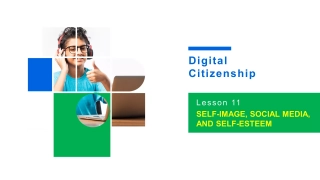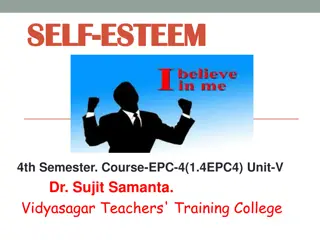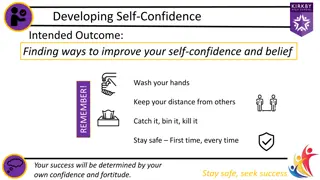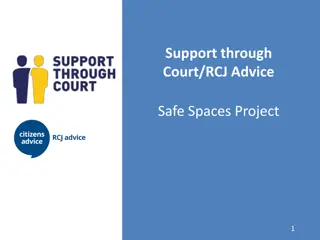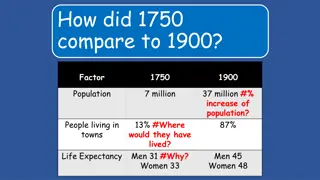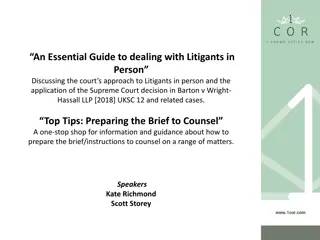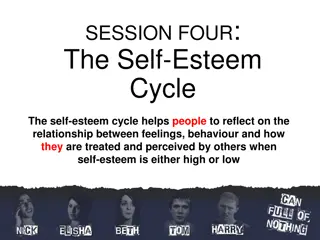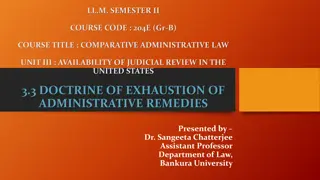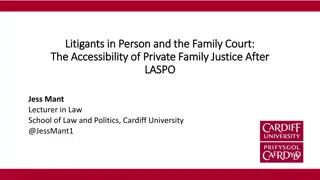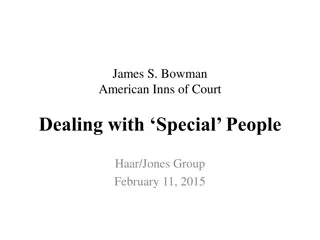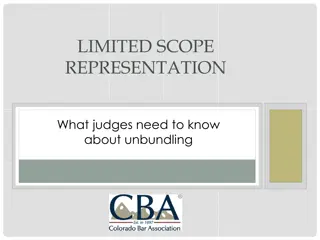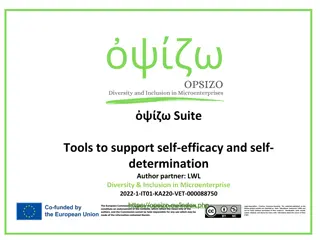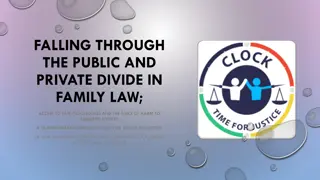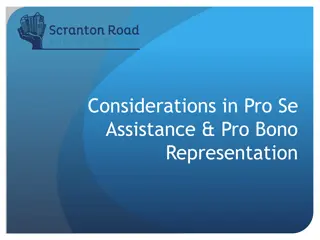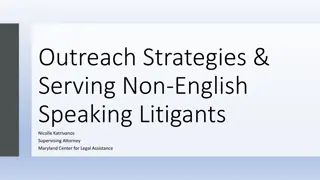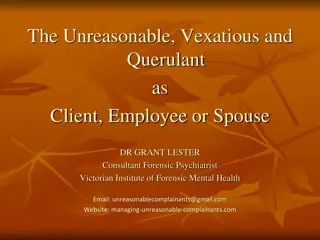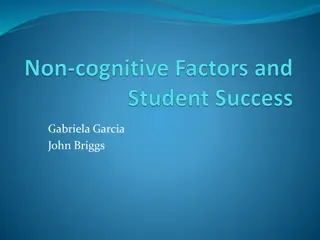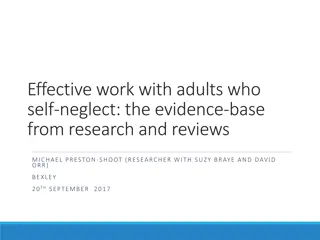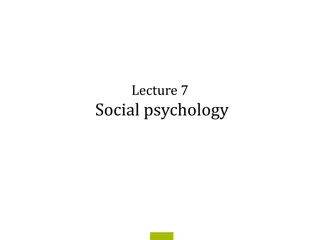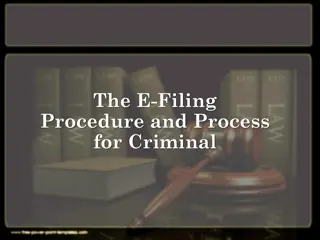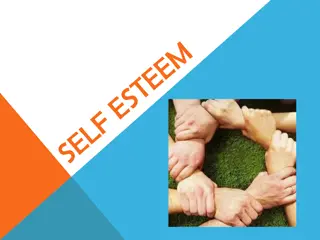Digital Citizenship: Self-Image, Social Media, and Self-Esteem
Explore the impact of social media on self-image and self-esteem. Learn about the influence of filters and media on body perception. Reflect on self-assessment and take-home activities to improve self-confidence.
3 views • 11 slides
Understanding Self-Worth in Children: Building a Strong Foundation
Explore the importance of self-concept, self-esteem, and self-worth in children's development. Learn how parents can positively impact a child's self-perception and self-value through nurturing experiences. Discover the key sources influencing children's self-worth and the critical role of early lif
0 views • 30 slides
Understanding Self-Esteem: Meaning, Importance, and Types
Self-esteem is how we perceive our worth and value. High self-esteem leads to confidence and positivity, while low self-esteem can result in self-doubt and negative emotions. Self-esteem impacts mental health, behavior, decisions, relationships, and overall success in life. Recognizing and nurturing
2 views • 15 slides
Understanding Self-Esteem and Ways to Improve It
Self-esteem is our perception of ourselves, impacting how we navigate life. Healthy self-esteem fosters positivity, while low self-esteem can be detrimental. Various factors, like childhood experiences, contribute to low self-esteem, but steps can be taken to improve it. Building positive relationsh
0 views • 14 slides
Understanding the Self: Psychology's Focus and Implications
The field of psychology has long been intrigued by the concept of self, exploring its importance to well-being, self-esteem, and brain localization. Research reveals how excessive optimism, self-bias, and blindness to incompetence can impact self-esteem. Contrasting individualist and collectivist cu
1 views • 41 slides
Building Self-Confidence: Key Steps and Benefits
Understanding self-confidence, its importance, and how to develop it can lead to enhanced resilience, motivation, reduced fear and anxiety, and a stronger sense of self. Self-confidence allows for confident behavior, while lack of it can lead to self-doubt and avoidance of risks. Learning to embrace
0 views • 7 slides
The Importance of Self-Awareness in Personal Growth
Self-awareness is crucial for understanding one's character, feelings, and motivations. It helps in recognizing strengths and weaknesses, managing stress, improving communication, and fostering empathy. Developing self-awareness involves introspection, mindfulness, self-reflection, and seeking feedb
2 views • 47 slides
Developing a Self-Care Action Plan for Overall Well-Being
Self-care involves deliberate activities to nurture mental, emotional, physical, and spiritual health, yet it is often neglected. This guide explores the essence of self-care, emphasizes the importance of building a personalized self-care action plan, and provides insights into taking care of your b
0 views • 19 slides
Effective Supervision of Court Staff - Duties and Responsibilities
Introduction to the effective supervision of court staff, outlining the duties and responsibilities of different roles such as readers, stenographers, computer operators, and muharirs in a judicial setting. The process of supervision helps ensure smooth operations and efficient dispensation of justi
1 views • 15 slides
Support Through Court: Helping Litigants in Person Navigate Legal Proceedings
Support Through Court, a charity dedicated to supporting Litigants in Person, offers practical and emotional assistance to individuals facing family and civil court proceedings without legal representation. Through a network of offices staffed by volunteers and professionals, they provide invaluable
0 views • 22 slides
Comparing 1750 to 1900: Population Growth in Britain
The population of Britain saw a significant increase between 1750 and 1900. In 1750, the population was 7 million, and by 1900, it had grown to 37 million. This represented an 87% increase. The number of people living in towns also rose from 13% to a higher percentage. Factors contributing to this g
0 views • 6 slides
Understanding Litigants in Person: A Comprehensive Guide
Explore the court's perspective on litigants in person, with insights from the Barton v Wright-Hassall LLP [2018] UKSC 12 case. Learn about the significance of LiPs, the impact on justice accessibility, and key legal considerations pre-Barton. Gain practical tips for briefing counsel effectively. De
0 views • 19 slides
Understanding Binary Codes and Self-Complementing Codes
The concept of binary codes, including Binary Coded Decimal (BCD) codes, and self-complementing codes is explored in this informative content. Learn about how decimal numbers are represented in binary form, the structure of BCD codes, and the properties of self-complementing codes like 2421 and Exce
2 views • 34 slides
Enhancing Self-Confidence for Professional Success
Understanding the importance of self-confidence in the workplace is crucial for personal growth and career advancement. Self-confident individuals trust their abilities, maintain a sense of control over their lives, and have realistic expectations. This summary delves into the characteristics of sel
0 views • 13 slides
Main Represented Figures for Quarter Ended March 31, 2017 - Financial Insights
The provided information details the main represented figures for the quarter ended March 31, 2017, focusing on revenue, EBITDA, operating income, net income, investments, cash flow, and financial debt within the context of IFRS adjustments. It also includes a breakdown of revenue by segment for the
5 views • 4 slides
Understanding the Self-Esteem Cycle: High vs Low Self-Esteem
The self-esteem cycle explores the interplay between one's feelings, behavior, and how they are treated based on their self-esteem level. High self-esteem is associated with positive feelings, supportive behavior, and positive interactions, while low self-esteem manifests in negative emotions, withd
9 views • 4 slides
Doctrine of Exhaustion of Administrative Remedies in Comparative Administrative Law
The doctrine of exhaustion of administrative remedies requires litigants to pursue all available remedies with administrative authorities before seeking judicial review. Originating from the case of Myers v. Bethlehem Shipbuilding Corp, this doctrine aims to respect congressional intent and promote
1 views • 12 slides
Understanding the California Supreme Court Review Process
Explore the workings of the California Supreme Court in considering petitions for review, filing statistics, and the challenges faced by litigants seeking review. Learn about the criteria for selecting petitions, filing statistics, and client considerations in pursuing a petition. Discover the small
0 views • 14 slides
Enhancing Access to Justice through Limited Assistance Representation in Massachusetts
The Massachusetts Judiciary, led by First Justice Hon. Dina E. Fein, has implemented Limited Assistance Representation (LAR) to allow attorneys to assist self-represented litigants on a limited basis. This initiative aims to expand access to justice by providing legal support without full representa
0 views • 8 slides
Challenges of Litigants in Person in Family Court Proceedings
Self-representation in the family court post-LASPO has become the norm, with a majority of hearings involving at least one Litigant in Person (LIP). These individuals face various obstacles such as domestic abuse, learning difficulties, and limited access to resources. The research project sheds lig
0 views • 12 slides
Enhanced Family Court Police Disclosure Protocol for 2024
The 2024 Family Court Police Disclosure Protocol addresses key issues identified in the 2013 protocol, emphasizing timely and proportionate requests for material. Changes include a new checklist for the judiciary, guidance notes, and revised processes for litigants in person. The protocol provides c
1 views • 19 slides
Enhancing Self-Regulation for Formative Assessment through Social and Emotional Learning
Explore the significance of self-regulation in formative assessment, understand key concepts like self-control, emotional competence, and perseverance. Discover actionable strategies to implement self-regulation interventions with students and train other adults effectively. Future orientation and s
0 views • 25 slides
Understanding Mindful Self-Judgment and Its Role in Mental Health
Mindful self-judgment is a complex concept that involves balancing self-awareness and self-compassion. While nonjudgment is a key aspect of mindfulness practices, there is a debate on whether mindful self-judgment can be appropriate and functional in certain circumstances. Researchers like June Pric
2 views • 46 slides
Access to Justice Through Public Legal Education in Alberta
The Centre for Public Legal Education Alberta (CPLEA) is a not-for-profit organization offering plain language legal education and information to empower individuals in understanding their rights and responsibilities. Public Legal Education (PLE) helps people address legal issues independently by pr
0 views • 20 slides
Understanding Self-Esteem: Highs and Lows
Self-esteem is the judgment we hold about ourselves, shaped by experiences and relationships. High self-esteem individuals embrace new encounters with confidence and positivity, while low self-esteem individuals struggle with self-doubt and criticism. Recognizing signs of low self-esteem is crucial
0 views • 11 slides
Enhancing Self-Regulation Skills in Children: Strategies and Tips
Understanding and fostering self-regulation in children is crucial for their development. Self-regulation involves controlling impulses, focusing, and shifting between tasks. This article delves into the internal mechanisms of self-regulation, such as executive function, and provides practical tips
1 views • 22 slides
Dealing with Jerks in the Legal Profession
This content discusses the challenges lawyers face when dealing with difficult individuals in the legal field, known as "jerks." It provides examples of jerk behavior, tips on differentiating them from advocates, and strategies for handling such situations professionally. The discussion delves into
0 views • 34 slides
Understanding Limited Scope Representation in Legal Matters
Limited Scope Representation, also known as unbundling, is a practice where an attorney and a client agree that the attorney will handle specific aspects of a legal matter, rather than the entire case. This approach offers flexibility, cost-effectiveness, and increased client control. Judges play a
0 views • 22 slides
Understanding McKenzie Friends and Their Role in Legal Proceedings
McKenzie Friends are individuals who provide lay assistance and support to litigants representing themselves in court. They can offer moral support, take notes, help with case papers, and quietly advise on case conduct. However, they are not allowed to act as agents for the litigants or address the
0 views • 12 slides
Boosting Your Child's Self-Esteem & Confidence in Parenting Workshop Series
Understanding self-esteem in children is crucial for their emotional development. Healthy self-esteem leads to positive behaviors, while low self-esteem can result in negative self-perceptions. Recognizing signs of healthy and unhealthy self-esteem allows parents to support and nurture their child's
0 views • 11 slides
Enhancing Self-Efficacy and Self-Determination in the Workplace
Establishing high levels of self-efficacy and self-determination in the workplace is crucial for accomplishing tasks and goals effectively. This publication explores the significance of these traits, providing strategies for managers to foster and maintain them. Discover why self-efficacy and self-d
0 views • 8 slides
Falling Through the Public and Private Divide in Family Law
Exploring the impacts of the public-private division in family law, this research delves into access to fair proceedings and the associated risks to children and society. Dr. Jane Krishnadas leads the discussion on a transformative methodology for enhancing access to justice, shedding light on the c
0 views • 35 slides
Understanding Pro Se Assistance and Pro Bono Representation
This material delves into the considerations, course outlines, justifications, and constitutional basis for assisting pro se litigants and encouraging pro bono representation. It covers the need for self-representation, limitations to the right, the increase in pro se litigants, and the constitution
0 views • 51 slides
Innovative Outreach Strategies for Serving Non-English Speaking Litigants
This presentation covers outreach strategies by Nicolle Katrivanos, Supervising Attorney at the Maryland Center for Legal Assistance, focusing on serving non-English speaking litigants. The strategies include expanding services within immigrant communities through various programs and collaborations
0 views • 10 slides
Understanding Unreasonable Complainants: A Forensic Psychiatry Perspective
Explore the spectrum of complainants, from normal to unreasonable and querulant, as discussed by Dr. Grant Lester, a consultant forensic psychiatrist. Learn about the behaviors and characteristics of vexatious litigants, obsessive personalities, and those with pre-existing schizophrenia. Gain insigh
0 views • 14 slides
Exploring Non-Cognitive Factors as Predictors of Student Success in Higher Education
This study delves into whether utilizing an assessment instrument measuring non-cognitive attributes can predict student success at a large, urban, public university with a significant Under-Represented Minority population. The research focuses on non-academic factors like academic self-efficacy, re
0 views • 44 slides
Understanding Self-Neglect in Adults: Challenges and Research Insights
This content delves into the complex issue of self-neglect in adults, covering its definition, key challenges, and the research evidence available. It explores the various aspects of self-neglect, including neglect of self-care, domestic environment, and refusal of services. The challenges associate
0 views • 39 slides
Understanding the Self in Social Psychology
Delve into the concept of the individual and the self in social psychology, exploring how identities have evolved historically and the distinction between collective and individual selves. Learn about self-awareness, Wundt's differentiation of I and me, and Higgins' self-discrepancy theory, shedding
0 views • 84 slides
Understanding Criminal E-Filing Procedure and Document Formats
Explore the detailed process of e-filing for criminal cases, including points of interest, document format requirements, form/template modifications, and guidelines for Pro Se litigants and unrepresented parties. Learn about email designations, submission errors, and recommended practices for effici
0 views • 16 slides
Boosting Self-Esteem: Benefits and Tips for Improvement
Understanding self-esteem, its benefits, and risks of low self-esteem are essential for personal growth. Developing high self-esteem can lead to increased self-respect, goal achievement, and willingness to try new things. On the other hand, low self-esteem can make individuals vulnerable to peer pre
0 views • 10 slides
